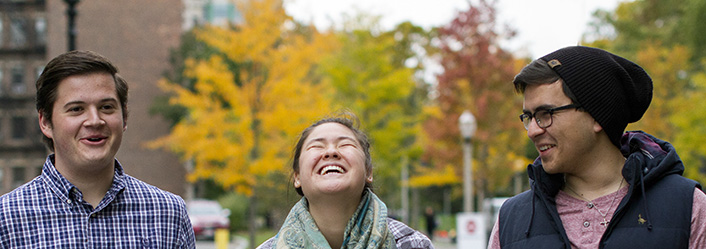

Fr. Scott Kallal is one of the first Apostle of the Interior Life priests whose ministry primarily consists of spiritual direction and helping young people discern their vocations. After studying bioengineering at the University of Illinois at Urbana-Champaign where he was a FOCUS student leader, he got his STB from the Pontifical University of the Lateran and his STL from the Pontifical Institute of Spirituality Teresianum.
As we look toward Thanksgiving and the holy season of Advent coming shortly after it, our thoughts turn to giving thanks and prayerful reflection. We asked Fr. Scott to share his insight into the correlation between gratitude and a life of prayer. He shares his thoughts below.
Q: In our faith, how is gratitude linked to authentic worship and prayer?
Fr. Scott: Gratitude is itself a form of prayer. Everything we have and are is a gift from God our Creator. In the term we have for our highest form of worship — “Eucharist” [from the Greek eukharistia, “thanksgiving] — we see that thanksgiving is “true giving.” It is that which we can give to God because it is the gift of our heart’s joy. Something God can’t have unless we give it to Him in freedom.
Gratitude is deeply human and deeply spiritual. There is no animal equivalent to gratitude, and while all cultures have expressions of gratitude, there is no facial expression that is universally recognized as gratitude. This is a clear indication that gratitude goes beyond the natural to the supernatural.
Q: Are there any models of prayer and gratitude among the saints or church leaders?
Fr. Scott: St. John of Ávila, new doctor of the Church, would spend his whole morning in thanksgiving for the Eucharist he had received that morning.
St. Teresa of Ávila relates gratitude to humility. She says humility is a two-sided coin. On the one side is gratitude for the great gifts our King has bestowed upon us. On the other is magnanimity, the desire to use the gifts we’ve been given to do great things for our King.
St. Francis de Sales puts the beginning of our commitment to live “a devout life” in a sense of gratitude, giving thanks for the blessings God has bestowed upon us generally (bodies, rational souls, memory, intellect, will, etc.) and personally (our own story, our family, our friends and little graces along the way).
There are three examples. But if there is a saint who didn’t have gratitude, I don’t know them.
Q: What would you say are the dangerous habits or mindsets to be aware of that can interrupt a spirit of thanksgiving in prayer?
Fr. Scott: I think there are a number of dangers. Here are a few:
Q: As we head closer to the season of Advent, what are good practices to employ in prayer to keep one’s mind and heart on giving thanks to God?
Fr. Scott: Schedule time every day to give thanks to God. It should be at least 15 minutes. If you can’t do that, start with five. If you say you don’t have time, that’s a lie. You have 24 hours like everyone else. There is always time. If you’re wild and crazy like me, use NET-time: No Extra Time. What I mean is, be grateful while you brush your teeth, while you drive to work, while you exercise, while you drive your kids to school.
Also, when I have “problems” (a.k.a. challenges or opportunities), I love to ask myself the following:
Finally, ask others: What are you grateful for? Spread the gratitude around.
Q: What other encouragements would you like to share about gratitude and prayer?
Fr. Scott: Ultimately, gratitude is the foundation of the spiritual life because everything is a gift. Sometimes we get so caught up in our feelings and let them take control. But everyone has something to be grateful for — and perhaps the most profound thing is this: Whatever is going on in your life, there is a God who loves you. Whatever sins you’re caught up in, Jesus Christ died on the cross for you. Whatever darkness you live in, the Holy Spirit has been sent to set you free. Whatever wounds you have, the Church is here to offer you healing. Whatever fears you face, we are here as brothers and sisters to wage war together against all the powers of darkness.

